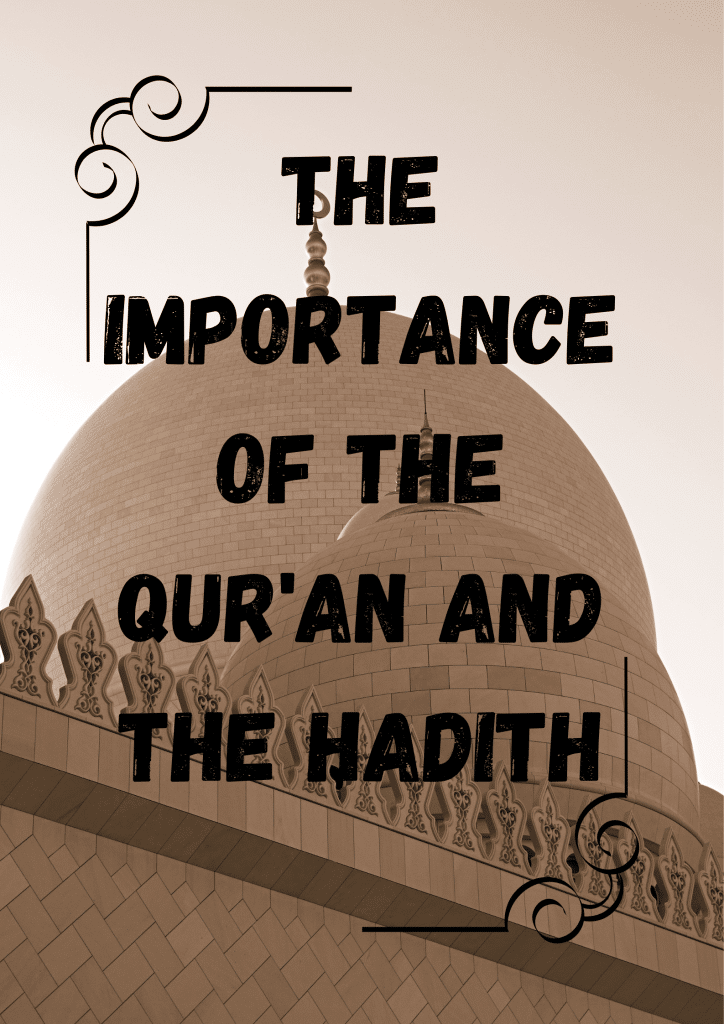The importance of Qur’an and Hadith: The Qur’an and the Hadith are central to Islam and play a significant role in the daily lives of Muslims around the world.
The Qur’an, which Muslims believe to be the word of God revealed to the prophet Muhammad, is the primary source of Islamic teachings and law. It is considered the most important text in Islam and is widely studied and revered by Muslims. The Qur’an is believed to be eternal and unchanged, and is seen as a source of guidance and wisdom for Muslims.
The Hadith, which are the sayings and actions of Muhammad, are also highly important in Islam. The Hadith provide insight into the life and teachings of Muhammad and serve as a source of guidance and inspiration for Muslims. They are considered to be second in importance only to the Qur’an and are widely studied and quoted by Muslims.
Both the Qur’an and the Hadith are central to the Islamic faith and are integral to the daily practice of Islam. They provide Muslims with guidance on how to live a moral and righteous life in accordance with the teachings of Islam. Muslims rely on the Qur’an and the Hadith to inform their beliefs and practices, and they hold these texts in the highest regard.
In addition to providing guidance on how to live a moral and righteous life, the Qur’an and the Hadith also play a central role in the development of Islamic law, or sharia. Sharia is based on the Qur’an and the Hadith, as well as on the principles of justice, fairness, and equality. It provides a legal framework for the daily lives of Muslims and covers a wide range of topics, including personal conduct, family life, and business transactions.
The importance of Qur’an and Hadith
The Qur’an and the Hadith are also an important part of Islamic education and are studied by Muslims of all ages. Many Muslims memorize the Qur’an and study the Hadith as a way to deepen their understanding of Islam and to draw closer to God. In addition, the Qur’an and the Hadith are often recited and studied in the context of group prayer, which is an important part of Islamic practice.
Overall, the Qur’an and the Hadith are central to Islam and play a significant role in the daily lives of Muslims around the world. They provide guidance, inspiration, and a legal framework for Muslims as they seek to live a moral and righteous life in accordance with the teachings of Islam.
Another important theme in the Qur’an and the Hadith is the importance of compassion and justice. The Qur’an teaches that all people are equal in the eyes of God and that it is the duty of Muslims to stand up for justice and to help those who are suffering. The Hadith also emphasize the importance of compassion and kindness, and encourage Muslims to be charitable and to help those in need.
The Qur’an and the Hadith also place a strong emphasis on the importance of family and community. Islam teaches that the family is the foundation of society and that it is the responsibility of each member of the family to support and care for one another. The Qur’an and the Hadith provide guidance on how to build strong and healthy families and communities and how to maintain harmonious relationships with others.
In addition to these themes, the Qur’an and the Hadith also address a wide range of other topics, including personal conduct, business ethics, and social justice. They provide guidance and inspiration for Muslims as they navigate the challenges of daily life and seek to live in accordance with the teachings of Islam.
Another important aspect of the Qur’an and the Hadith is their emphasis on personal and spiritual development. Islam places a strong emphasis on the importance of cultivating a close relationship with God and on the importance of personal growth and self-improvement. The Qur’an and the Hadith provide guidance on how to develop a strong spiritual connection with God and how to live a life that is pleasing to Him.
Prayer is an important part of this process and is a central aspect of Islamic practice. The Qur’an and the Hadith provide guidance on the proper way to pray and on the importance of maintaining a regular prayer schedule. In addition to formal prayers, the Qur’an and the Hadith encourage Muslims to communicate with God through personal reflection and contemplation.
The Qur’an and the Hadith also encourage Muslims to seek knowledge and to continually learn and grow. This includes not only knowledge about Islam and religious matters, but also knowledge about the world around us. The Qur’an and the Hadith encourage Muslims to seek out wisdom and to use their knowledge to serve others and to make the world a better place.
Overall, the Qur’an and the Hadith are a rich source of guidance and inspiration for Muslims. They provide teachings on a wide range of topics and encourage Muslims to live a life of submission to God, compassion, justice, and personal and spiritual growth.
Another important aspect of the Qur’an and the Hadith is their emphasis on the importance of community and social responsibility. Islam teaches that all Muslims are part of a single community, known as the ummah, and that it is the responsibility of each member of the community to care for one another and to work together for the common good. The Qur’an and the Hadith encourage Muslims to be active members of their communities and to contribute to the betterment of society.
One way that Muslims can fulfill their social responsibilities is through the practice of charity and philanthropy. Both the Qur’an and the Hadith place a strong emphasis on the importance of helping those in need and of supporting those who are less fortunate. Muslims are encouraged to be generous in their giving and to share their wealth and resources with others.
In addition to individual acts of charity, the Qur’an and the Hadith also encourage Muslims to work together to address social problems and to promote justice and fairness. This can take many forms, such as participating in community service projects, advocating for social change, or working to improve the lives of others through charitable organizations.
Overall, the Qur’an and the Hadith encourage Muslims to be active and responsible members of their communities and to work together for the common good. They provide guidance on how to live a life that is grounded in compassion, charity, and social responsibility.
One final aspect of the Qur’an and the Hadith that is worth mentioning is their emphasis on the importance of personal conduct and moral character. Islam teaches that every action a person takes has consequences, and that it is important to strive to live a life that is grounded in moral principles.
The Qur’an and the Hadith provide guidance on how to live a moral and upright life and encourage Muslims to develop strong character traits such as honesty, kindness, compassion, and self-control. They also provide guidance on how to avoid behaviors that are considered harmful or detrimental, such as lying, stealing, and engaging in unethical or irresponsible actions.
In addition to personal conduct, the Qur’an and the Hadith also address broader social and political issues and provide guidance on how to create a just and fair society. They encourage Muslims to work towards the establishment of a society that is based on fairness, equality, and respect for the rights and dignity of all individuals.
Overall, the Qur’an and the Hadith provide Muslims with a comprehensive set of guidelines for living a moral and righteous life. They encourage Muslims to develop strong character, to act with integrity, and to work towards creating a just and fair society.
It is worth noting that while the Qur’an and the Hadith are highly respected and revered by Muslims, they are also subject to interpretation. Different scholars and schools of thought within Islam may have different interpretations of specific passages or teachings. This can lead to differences of opinion on various issues within the Muslim community.
Despite these differences, the Qur’an and the Hadith remain the central and unifying texts of Islam. They provide a foundation for Islamic beliefs and practices and are a source of guidance and inspiration for Muslims around the world.
In addition to their role as religious texts, the Qur’an and the Hadith also have a rich literary and artistic tradition within Islam. The Qur’an is revered for its beautiful language and is often recited in a melodic and rhythmic manner. The Hadith also contain many stories and sayings that have been passed down through the centuries and have inspired literature, poetry, and other forms of artistic expression within the Muslim world.
Overall, the Qur’an and the Hadith are central to Islam and play a significant role in the daily lives of Muslims around the world. They provide guidance, inspiration, and a foundation for the Islamic faith and have a rich tradition within Islamic culture and literature.




